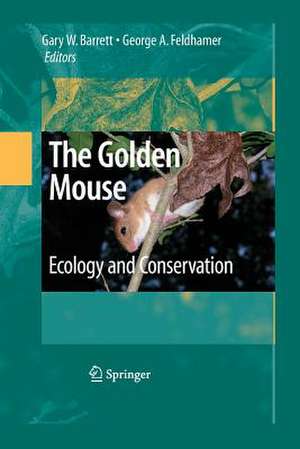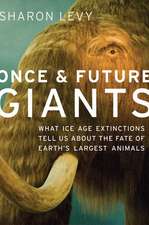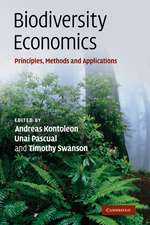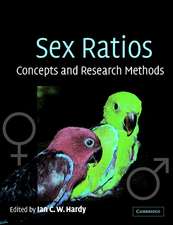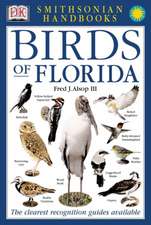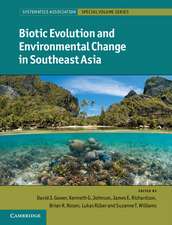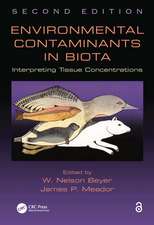The Golden Mouse: Ecology and Conservation
Editat de Gary W. Barrett, George A. Feldhameren Limba Engleză Paperback – 8 oct 2014
At the individual level, the authors discuss topics such as natural history, systematics, behavior, nest construction, home range, and movements, as well as the unique bioenergetic strategy of the golden mouse, their population dynamics, growth, and genetics. At the community level, coexistence with sympatric species, competitive interactions, mutualism, parasitism, and the benefits of semi-arboreal living are discussed. Chapters also provide direction for further research by including questions yet to be addressed, intended to promote future integrative studies across levels of organization.
| Toate formatele și edițiile | Preț | Express |
|---|---|---|
| Paperback (1) | 577.04 lei 6-8 săpt. | |
| Springer – 8 oct 2014 | 577.04 lei 6-8 săpt. | |
| Hardback (1) | 559.63 lei 38-45 zile | |
| Springer – 6 dec 2007 | 559.63 lei 38-45 zile |
Preț: 577.04 lei
Preț vechi: 678.87 lei
-15% Nou
Puncte Express: 866
Preț estimativ în valută:
110.44€ • 114.99$ • 93.33£
110.44€ • 114.99$ • 93.33£
Carte tipărită la comandă
Livrare economică 07-21 martie
Preluare comenzi: 021 569.72.76
Specificații
ISBN-13: 9781489993519
ISBN-10: 1489993517
Pagini: 268
Ilustrații: XVIII, 239 p.
Dimensiuni: 155 x 235 x 14 mm
Greutate: 0.38 kg
Ediția:2008
Editura: Springer
Colecția Springer
Locul publicării:New York, NY, United States
ISBN-10: 1489993517
Pagini: 268
Ilustrații: XVIII, 239 p.
Dimensiuni: 155 x 235 x 14 mm
Greutate: 0.38 kg
Ediția:2008
Editura: Springer
Colecția Springer
Locul publicării:New York, NY, United States
Public țintă
Professional/practitionerCuprins
The Golden Mouse: A Levels-of-Organization Perspective.- The Golden Mouse: Taxonomy and Natural History.- Levels of Organization.- Population Ecology of the Golden Mouse.- Community Ecology of the Golden Mouse.- Ecosystem Ecology of the Golden Mouse.- Landscape Ecology of the Golden Mouse.- Transcending Processes.- Relative Abundance and Conservation: Is the Golden Mouse a Rare Species?.- The Golden Mouse: A Model of Energetic Efficiency.- Nesting Ecology of the Golden Mouse: An Oikos Engineer.- Ectoparasites, Bots, and Vector-Borne Diseases Associated with the Golden Mouse.- New Perspectives and Future Challenges.- Aesthetic Landscapes of the Golden Mouse.- Future Challenges and Research Opportunities: What Do We Really Know?.
Recenzii
From the reviews:
"A concise scholarly volume that summarizes the natural history of the Golden Mouse … . Highly recommended reading for students and professionals in mammalogy, ecology, wildlife biology, as well as readers with an interest in natural history." (Southeastern Naturalist, Issue 7/3, 2008)
"In The Golden Mouse: Ecology and Conservation, Barrett and Feldhamer have compiled a set of chapters that give us a glimpse into the intriguing world of their study species … . I found this to be an interesting and generally enjoyable read. … it will be of greatest appeal to ecologists and conservation biologists who likewise share a passion for small mammals. … it should serve as a valuable guide for those investigating other species with which the golden mouse interacts." (Catherine E. Burns, Journal of Mammal Evolution, Vol. 16, 2009)
"A concise scholarly volume that summarizes the natural history of the Golden Mouse … . Highly recommended reading for students and professionals in mammalogy, ecology, wildlife biology, as well as readers with an interest in natural history." (Southeastern Naturalist, Issue 7/3, 2008)
"In The Golden Mouse: Ecology and Conservation, Barrett and Feldhamer have compiled a set of chapters that give us a glimpse into the intriguing world of their study species … . I found this to be an interesting and generally enjoyable read. … it will be of greatest appeal to ecologists and conservation biologists who likewise share a passion for small mammals. … it should serve as a valuable guide for those investigating other species with which the golden mouse interacts." (Catherine E. Burns, Journal of Mammal Evolution, Vol. 16, 2009)
Notă biografică
Gary Barrett, Odum Professor of Ecology at the University of Georgia, is the author of Landscape Ecology of Small Mammals, published by Springer in 1999, which has sold 846 copies. He is also the author with the late Eugene Odum of Fundamentals of Ecology, 5/e, published in 2004.
George A. Feldhamer is Professor of Zoology, and Director of the Environmental Studies Program at Southern Illinois University, Carbondale, IL.
George A. Feldhamer is Professor of Zoology, and Director of the Environmental Studies Program at Southern Illinois University, Carbondale, IL.
Textul de pe ultima copertă
No group of mammals has more species than Rodentia. With close to 2300 recognized species throughout the world, Rodents comprise about forty-two percent of all living mammalian species. These mammals can have major impacts on human life—they can be major crop depredators, vectors of disease, and important models for scientific research. When we hear the familiar phrase charismatic mammalian megafauna, we immediately envision large, powerful carnivores like lions and grizzly bears, or sleek, graceful ungulates like deer and antelope. But we rarely hear about charismatic mammalian microfauna, such as mice. The golden mouse is considered by many to be the most charismatic and ecologically unique of the mammalian microfauna.
This volume is the first attempt to draw together what is known about the golden mouse ranging from systematics, natural history, and population dynamics to coexistence, nesting behavior, and semi-arboreal living in managed and natural ecological systems. In this scholarly work, the golden mouse is used as a model to explore conceptual issues in ecology across levels of organization from organism to landscape, integrating reductionism and holistic ecological science. Chapters also include ecological processes such as behavior, energetics, evolution, and regulation that transcend these levels of organization. Future integrative research studies across levels of organization also are addressed. The Golden Mouse: Ecology and Conservation will interest students and professionals in conservation biology, ecology, mammalogy, and wildlife management, as well as readers interested in natural history.
About the Editors:
Gary W. Barrett is Odum Professor of Ecology at the University of Georgia, Athens, GA. George A. Feldhamer is Professor of Zoology, and Director of the Environmental Studies Program at Southern IllinoisUniversity, Carbondale, IL.
This volume is the first attempt to draw together what is known about the golden mouse ranging from systematics, natural history, and population dynamics to coexistence, nesting behavior, and semi-arboreal living in managed and natural ecological systems. In this scholarly work, the golden mouse is used as a model to explore conceptual issues in ecology across levels of organization from organism to landscape, integrating reductionism and holistic ecological science. Chapters also include ecological processes such as behavior, energetics, evolution, and regulation that transcend these levels of organization. Future integrative research studies across levels of organization also are addressed. The Golden Mouse: Ecology and Conservation will interest students and professionals in conservation biology, ecology, mammalogy, and wildlife management, as well as readers interested in natural history.
About the Editors:
Gary W. Barrett is Odum Professor of Ecology at the University of Georgia, Athens, GA. George A. Feldhamer is Professor of Zoology, and Director of the Environmental Studies Program at Southern IllinoisUniversity, Carbondale, IL.
Caracteristici
Provides an in-depth discussion of the golden mouse at levels of organization from individual to landscape Uses the study of a single species as a model to explore broad conceptual issues in ecology Presents questions for future research in integrative ecosystem studies
